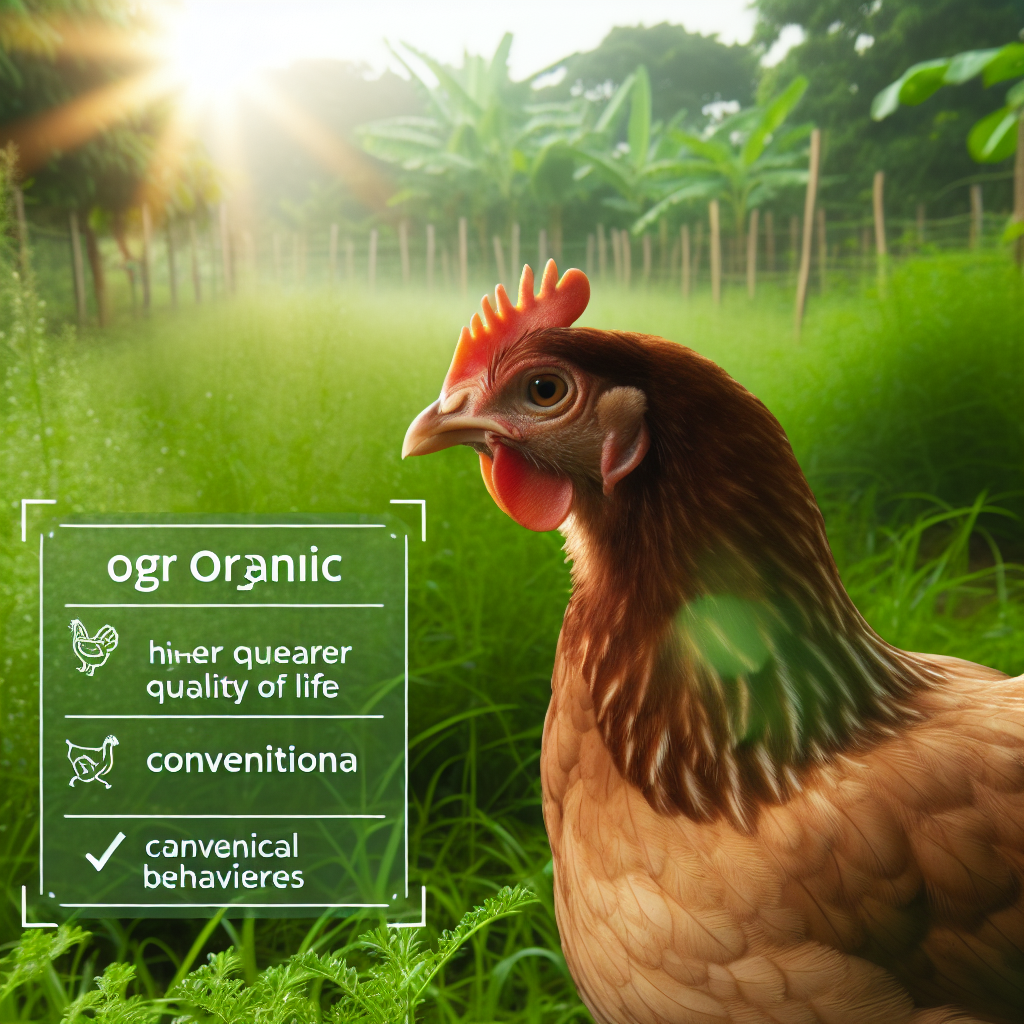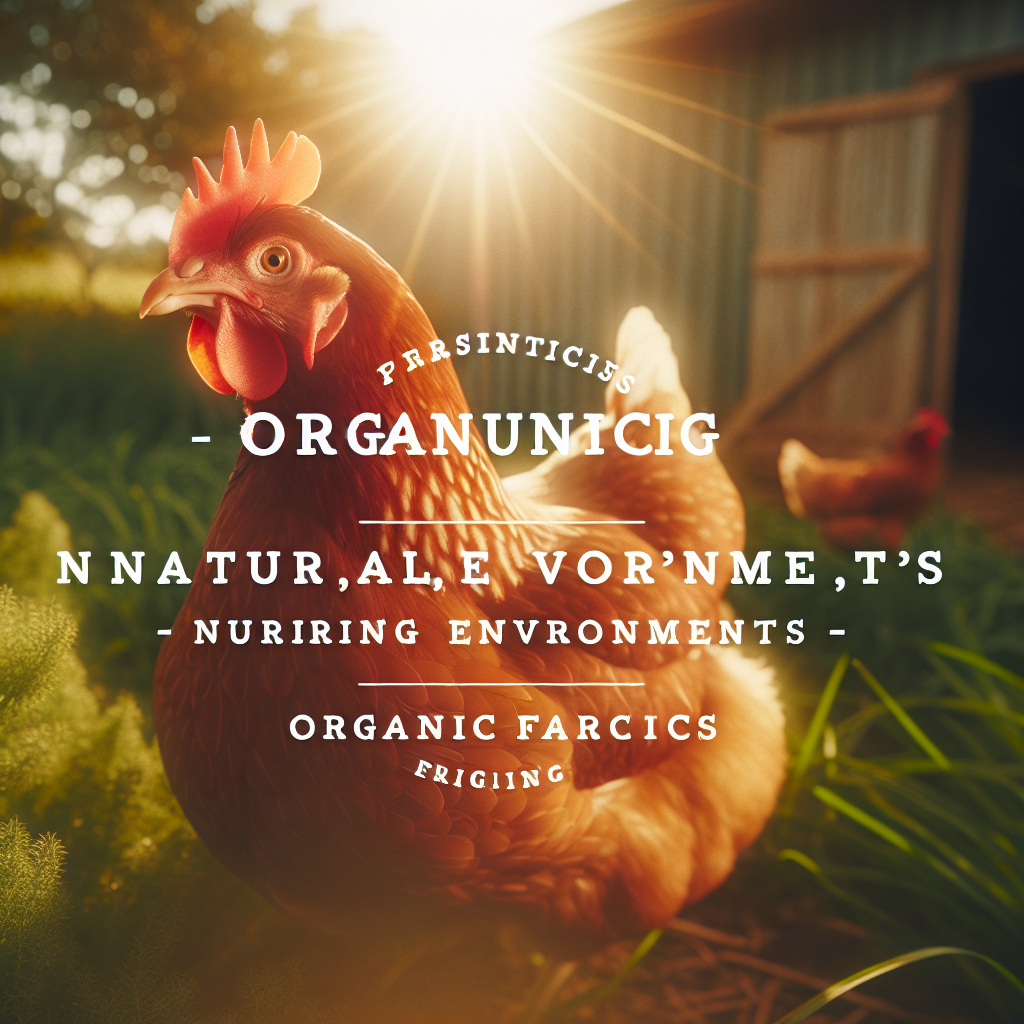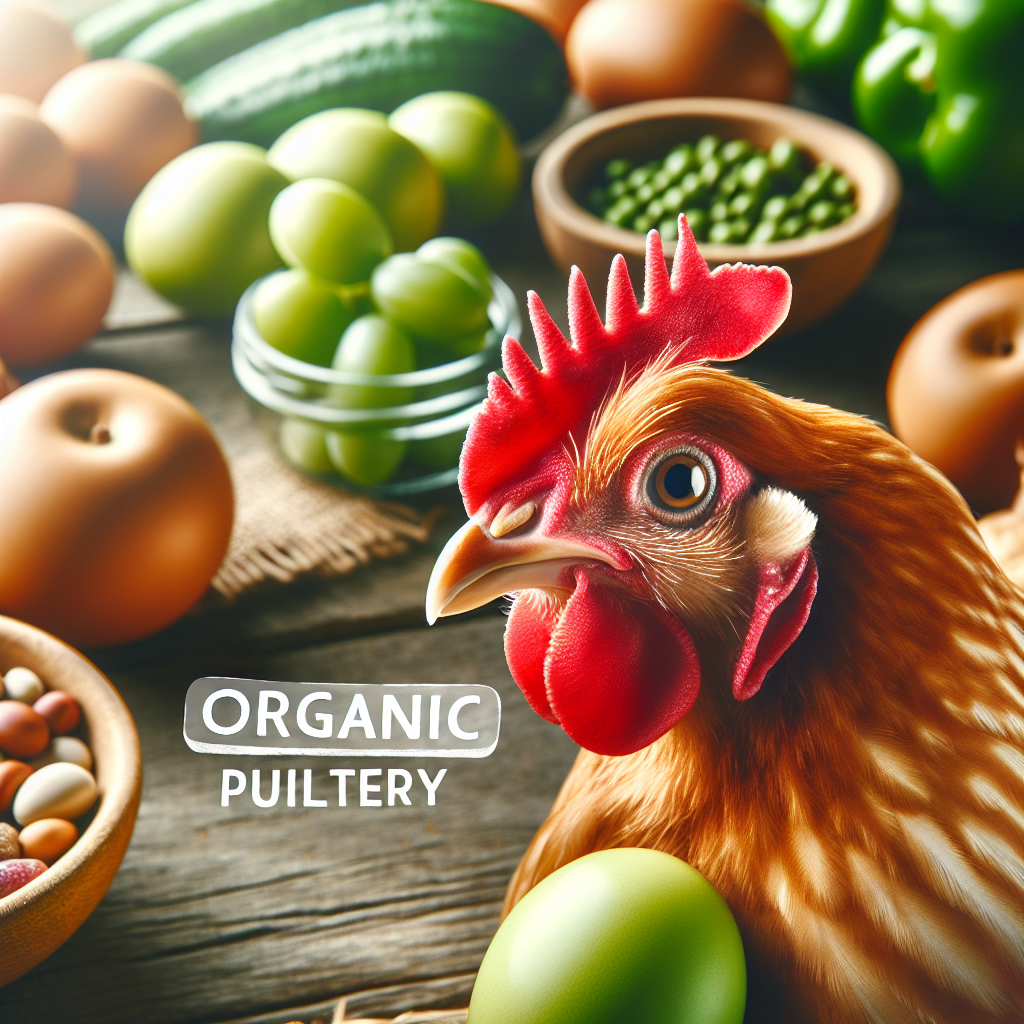Transitioning to organic poultry farming presents several challenges that farmers must navigate. This article explores the obstacles faced when making the shift to organic practices in poultry farming. From sourcing organic feed to providing adequate space and optimal living conditions for the birds, these challenges require careful planning and implementation. By understanding and addressing these hurdles, farmers can successfully transition to organic poultry farming and contribute to sustainable agricultural practices.
Regulatory Challenges
Obtaining Organic Certification
Transitioning to organic poultry farming comes with a set of regulatory challenges, starting with the process of obtaining organic certification. Organic certification ensures that the poultry farm meets the standards and guidelines required for organic production. To obtain certification, you will need to demonstrate that your farm follows organic practices, including providing organic feed, prohibiting the use of synthetic pesticides or hormones, and implementing appropriate animal welfare practices. This certification process can be time-consuming and requires thorough documentation and record-keeping.
Complying with Organic Standards
Once you have obtained organic certification, you will need to comply with the organic standards set by regulatory bodies. These standards cover various aspects of poultry farming, such as the use of organic feed, the prevention of contamination, and the management of pests and diseases. Complying with these standards involves implementing specific practices, maintaining proper documentation, and undergoing regular inspections to ensure ongoing compliance. It is essential to stay updated on any changes or updates to organic standards to ensure continuous compliance.
Meeting Health and Safety Regulations
In addition to organic certification, transitioning to organic poultry farming requires meeting health and safety regulations. These regulations aim to protect the health of the birds, farm workers, and consumers. They cover various aspects, such as proper handling and storage of organic feed, the use of safe and appropriate pest control methods, and the prevention of disease outbreaks. Meeting these regulations often involves implementing proper biosecurity measures, vaccination programs, and regular health monitoring. It is crucial to have a comprehensive understanding of these regulations and to ensure ongoing compliance to maintain the health and safety of your poultry farm.
Financial Challenges
Higher Initial Investment
Transitioning to organic poultry farming typically requires a higher initial investment compared to conventional poultry farming. This is primarily due to the need for organic infrastructure, including organic housing systems, organic feed storage facilities, and the purchase of organic-certified birds. Organic infrastructure tends to be more expensive due to the additional requirements and materials needed to meet organic standards. It is important to factor in these higher initial costs when planning to transition to organic poultry farming.
Increased Operating Costs
Operating costs are generally higher in organic poultry farming compared to conventional methods. One significant factor contributing to increased operating costs is the availability and cost of organic feed. Organic feed tends to be more expensive than conventional feed due to the limited supply and the higher costs associated with organic production. Additionally, implementing organic practices such as organic pest control methods and regular health monitoring may require additional labor and resources, further increasing operating costs. It is essential to carefully consider and budget for these increased operating costs to ensure the financial sustainability of your organic poultry farm.
Lower Profit Margins
While organic poultry farming has its benefits, it is important to acknowledge that it often comes with lower profit margins compared to conventional poultry farming. This is largely due to the higher costs associated with organic production, including the higher cost of organic feed, additional labor requirements, and the lower overall productivity of organic poultry systems. Organic products also typically command a higher price in the market, but the increased production costs can limit the profit margins. It is crucial to carefully analyze and plan your pricing strategy to ensure your organic poultry farm remains financially viable.
Infrastructure Challenges
Adapting Existing Facilities
Transitioning to organic poultry farming may require making significant changes to your existing poultry facilities. Organic housing systems typically have specific requirements, such as providing outdoor access, natural lighting, and suitable roosting and nesting areas. Adapting existing poultry facilities to meet these requirements can be challenging and may require substantial investments in infrastructure modifications. It is essential to carefully assess your existing facilities and develop a plan to adapt them to meet organic standards.
Implementing Proper Waste Management Systems
Proper waste management is a crucial aspect of organic poultry farming, as organic regulations require the effective management and utilization of poultry manure. Implementing proper waste management systems can be a significant challenge, especially if your existing facilities were not originally designed with organic farming in mind. Proper waste management systems may include composting, vermicomposting, or other methods of utilizing poultry manure as organic fertilizer. It is important to understand the regulatory requirements regarding waste management and implement appropriate systems to ensure compliance.
Ensuring Adequate Housing and Space
Organic poultry farming places emphasis on animal welfare and providing sufficient space for the birds. Meeting the space requirements for organic poultry can be a challenge, especially if your existing facilities were designed for conventional poultry farming, which often prioritizes maximizing production efficiency over space considerations. Ensuring adequate housing and space may involve expanding existing facilities or building new organic-certified housing structures. It is vital to plan for the space requirements of your organic birds and invest in appropriate housing to meet organic standards and provide optimal living conditions.
Feed Challenges
Availability of Organic Feed
One of the significant challenges of transitioning to organic poultry farming is the availability of organic feed. Organic feed is produced using organic farming practices and does not contain synthetic pesticides, GMOs, or other prohibited substances. However, organic feed is currently in limited supply compared to conventional feed. This limited availability can make it challenging to source enough organic feed to meet the dietary requirements of your organic poultry. It is essential to establish reliable relationships with organic feed suppliers and plan your feed procurement well in advance to ensure a consistent supply of high-quality organic feed.
Balancing Nutritional Requirements
Balancing the nutritional requirements of organic poultry can be more challenging compared to conventional poultry farming. Since synthetic additives and supplements are not allowed in organic production, it may be more difficult to achieve the desired balance of essential nutrients in the organic feed. Organic feed formulations need to meet the nutritional needs of the birds while adhering to organic standards. Working closely with a nutritionist or feed specialist who has experience in organic poultry farming can help ensure your birds receive the necessary nutrients while maintaining organic integrity.
Cost and Quality of Organic Feed
Organic feed tends to be more expensive than conventional feed due to the higher costs associated with organic production methods. This cost difference can pose a financial challenge, especially for larger poultry operations. Additionally, the quality of organic feed can vary, depending on factors such as the sourcing of organic ingredients and the manufacturing processes. It is crucial to carefully evaluate the cost and quality of potential organic feed suppliers to ensure that you are providing your birds with nutritionally balanced feed while maintaining cost-effectiveness.
Disease and Pest Management Challenges
Limited Use of Chemical Treatment
In organic poultry farming, the use of synthetic chemicals for disease prevention and pest control is limited or prohibited. This poses a significant challenge as it requires finding alternative methods for managing diseases and pests. Organic poultry farmers must rely on natural and biological control methods, such as habitat management, predator control, and beneficial insect release, to prevent and address disease and pest issues. Implementing these methods effectively and consistently can be more labor-intensive and may require additional knowledge and expertise.
Implementing Natural and Biological Control Methods
Implementing natural and biological control methods is an essential aspect of organic poultry farming. These methods involve creating a favorable environment for beneficial organisms, such as predatory insects or birds, that can help control pests and diseases. However, it can be challenging to establish and maintain a balance between the target pests and their natural predators. It requires careful monitoring, regular maintenance of habitat conditions, and prompt intervention when necessary. Working with experienced agronomists or pest control specialists can help you effectively implement natural and biological control methods on your organic poultry farm.
Preventing Outbreaks and Contamination
Preventing disease outbreaks and contamination is crucial in organic poultry farming. Since organic poultry systems tend to have lower stocking densities and rely on natural methods of disease prevention, preventing outbreaks requires careful management and vigilance. Biosecurity measures, such as controlling access to the farm, regular health monitoring, and quarantine protocols, are essential to minimize disease risks. Additionally, preventing contamination from external sources, such as neighboring conventional farms or contaminated water sources, requires proactive measures and careful monitoring. It is crucial to implement comprehensive disease prevention strategies and maintain strict biosecurity protocols to protect the health of your organic poultry and maintain organic integrity.
Market Challenges
Establishing Market Demand
One of the critical challenges of transitioning to organic poultry farming is establishing market demand for organic poultry products. While the demand for organic products has been steadily increasing, it can vary depending on the region and the target consumer base. Conducting market research and understanding the preferences and purchasing behaviors of your potential customers is essential to assess the market demand accurately. Establishing partnerships with local retailers, restaurants, and community organizations that value organic products can help create a market for your organic poultry products.
Competing with Conventional Poultry Producers
Transitioning to organic poultry farming often means competing with conventional poultry producers who can offer products at lower prices due to the economies of scale and lower production costs. Overcoming this challenge requires effectively communicating the benefits of organic poultry products, such as higher nutritional value, improved animal welfare, and reduced environmental impact. Developing a strong marketing strategy that highlights these unique selling points can differentiate your organic poultry products and attract consumers who value organic and sustainable food options.
Marketing Organic Poultry Products
Effectively marketing organic poultry products is vital to succeed in the organic marketplace. Organic consumers are often willing to pay a premium for products that align with their values, but they also prioritize factors such as freshness, quality, and convenience. Developing a strong brand identity and marketing message that resonates with your target audience can help attract and retain customers. Utilizing various marketing channels, such as social media, local farmers’ markets, and online platforms, can improve the visibility and accessibility of your organic poultry products.
Labor Challenges
Training and Skill Development
Transitioning to organic poultry farming often requires additional training and skill development for farm workers. Implementing organic practices, such as complying with organic standards, implementing natural pest control methods, and ensuring animal welfare, may require a different set of skills and knowledge compared to conventional farming. Providing necessary training and education opportunities for your workforce can help ensure that they have the skills and knowledge needed to effectively manage the organic poultry farm. Collaborating with agricultural extension services, organic farming organizations, or agricultural training institutions can provide valuable resources and support for training and skill development.
Increased Labor Intensity
Organic poultry farming tends to be more labor-intensive compared to conventional methods. This increased labor intensity is primarily due to the need for manual pest control, managing outdoor access for the birds, and providing regular health monitoring and care. The labor requirements may also vary seasonally, requiring additional resources during peak periods of production or when implementing specific organic practices. It is essential to accurately assess the labor needs of your organic poultry farm and ensure that you have a sufficient workforce to meet the demands of organic production.
Finding Skilled Workers
Transitioning to organic poultry farming may require finding skilled workers who have experience and knowledge in organic practices. Finding and hiring skilled workers who are familiar with organic regulations, organic pest control methods, and the specific requirements of organic poultry farming can be challenging. Regularly networking with organic farming communities, attending industry events, and reaching out to agricultural training institutions can help you connect with potential skilled workers. Offering competitive wages, providing opportunities for professional growth, and fostering a positive work environment can also attract and retain skilled workers for your organic poultry farm.
Consumer Perception Challenges
Educating Consumers about Organic Poultry
Consumer perception and awareness play a crucial role in the success of organic poultry farming. While the demand for organic products is growing, there may still be misconceptions or lack of knowledge among consumers about organic poultry farming practices and their benefits. Educating consumers about the organic certification process, the higher animal welfare standards, and the environmental benefits of organic poultry can help build consumer trust and increase demand for organic poultry products. Utilizing various educational channels, such as social media, farm visits, and educational materials, can help communicate the unique aspects of organic poultry farming to consumers.
Building Trust and Credibility
Building trust and credibility with consumers is essential in the organic poultry market. Consumers who choose to purchase organic poultry products often prioritize factors such as food safety, animal welfare, and environmental sustainability. Being transparent about your farming practices, providing detailed information about your organic certification, and maintaining high-quality standards can help build trust and credibility with consumers. Openly sharing your farm’s stories, values, and commitment to producing high-quality organic poultry can differentiate your products and foster a loyal customer base.
Addressing Misconceptions and Misperceptions
There may be misconceptions or misperceptions among consumers about organic poultry farming, such as the belief that organic products are not as safe or nutritious as conventional alternatives. It is crucial to address these misconceptions and provide accurate information to educate consumers. Communicating the rigorous organic standards, the absence of synthetic pesticides and hormones, and the positive impact of organic farming on animal welfare and the environment can help dispel common misconceptions. Engaging in open dialogues with consumers, answering their questions, and providing scientific evidence can contribute to a better understanding and appreciation of organic poultry farming.
Environmental Challenges
Reducing Environmental Impact
Transitioning to organic poultry farming brings environmental benefits by reducing the use of synthetic pesticides and fertilizers. Organic practices prioritize ecological sustainability and aim to minimize the environmental impact of poultry farming. However, achieving this goal requires careful management of resources, such as minimizing energy consumption, reducing water usage, and optimizing waste management. Implementing practices such as rainwater harvesting, renewable energy sources, and efficient resource utilization can help reduce the environmental impact of your organic poultry farm.
Preserving Soil and Water Quality
Organic poultry farming focuses on preserving soil and water quality by avoiding the use of synthetic chemicals and promoting organic fertilization methods. However, preserving soil and water quality can be challenging due to the intensive nature of poultry farming. Preventing soil erosion, managing nutrient runoff, and ensuring the proper disposal of poultry waste are critical aspects of maintaining soil and water quality. Implementing proper soil conservation practices, such as cover cropping, rotational grazing, and erosion control measures, can help preserve soil health. Utilizing appropriate waste management systems, such as composting and vermicomposting, can minimize the impact of poultry waste on water quality.
Minimizing Pollution and Waste
Transitioning to organic poultry farming requires minimizing pollution and waste. Organic regulations place emphasis on minimizing the use of synthetic inputs and promoting waste reduction and recycling. Minimizing pollution and waste can be challenging due to factors such as the disposal of poultry manure, managing bedding materials, and preventing nutrient runoff. Implementing effective waste management systems, such as composting or anaerobic digestion, can help convert poultry waste into valuable organic fertilizers and reduce pollution. Additionally, optimizing resource utilization, such as efficient water usage and energy conservation, can contribute to minimizing overall waste and pollution on your organic poultry farm.
Risk and Uncertainty Challenges
Adapting to Changing Regulations
Transitioning to organic poultry farming involves navigating a dynamic regulatory landscape. Organic regulations can change over time, and staying compliant requires continuous monitoring and adjustment of farm practices. Adapting to changing regulations can be challenging, as it may require adjusting infrastructure, altering management practices, or sourcing new inputs. Staying informed about regulatory updates, actively participating in industry associations, and seeking guidance from organic certification bodies can help you effectively adapt to changing regulations and maintain organic compliance.
Fluctuations in Market Prices
Market prices for organic poultry products can be subject to fluctuations due to various factors, such as supply and demand dynamics, changes in consumer preferences, or external market conditions. These fluctuations can present financial challenges for organic poultry farmers, as they may impact profit margins and overall profitability. Developing a resilient business plan that includes strategies for managing price fluctuations, diversifying product offerings, and maintaining a strong customer base can help mitigate the risks associated with market price volatility.
Uncertainty in Consumer Preferences
Consumer preferences can be influenced by various factors, including evolving dietary trends, food safety concerns, and changing perceptions of organic products. Uncertainty in consumer preferences presents a challenge for organic poultry farmers, as it may impact market demand and the overall viability of organic poultry farming. It is important to stay attuned to consumer trends and preferences, conduct market research, and engage with consumers to understand their changing needs and expectations. Adapting your product offerings and marketing strategies to align with evolving consumer preferences can help ensure the long-term success of your organic poultry farm.
In conclusion, transitioning to organic poultry farming involves navigating a range of challenges across regulatory, financial, infrastructure, feed, disease and pest management, market, labor, consumer perception, environmental, and risk and uncertainty aspects. While these challenges can be substantial, they can also be overcome with proper planning, knowledge, and dedication. By addressing these challenges head-on, organic poultry farmers can contribute to a more sustainable food system while meeting the growing demand for organic and ethically produced poultry products.




